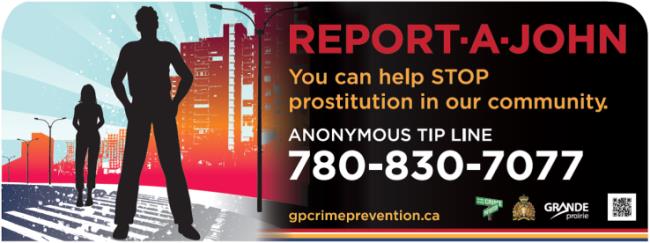The arrest of 35 accused johns in a downtown Grande Prairie sting last month brought mixed reactions from the public. While some on social media applauded the efforts of RCMP, others had questions as to why the local sex trade was being targeted and what resources are in place for the workers.
“Some people think that being on the street is a choice,” says Jen Spencer, coordinator for a women’s drop-in held by HIV North twice weekly in an undisclosed location. “Well, if you have a choice of an abusive home or a street, then sure, you’re making a choice to be on the street, but if you’re choosing from one bad thing to another, it’s not really a real choice.”
Spencer says there can be a lot of misconceptions about people in the sex trade. While some workers choose it as a profession, others have different motivations. When money is involved, she maintains sex is no longer consensual.
“When we’re at the street level sex trade, often it’s survival sex. It’s a means to an end; it’s safety for that night; it’s a place to sleep; it’s food; it’s drugs; it’s the fact that if I do this then somebody’s not going to hurt me later or I’m going to be able to be safe for now in that moment.”
In Canada, it is legal to sell sex but not buy it. However, it’s also illegal to advertise sexual services, which can lead to potentially dangerous miscommunication between workers and johns. Spencer argues prostitution laws don’t do enough to protect sex workers, and says there could be some negative effects stemming from the crack down on solicitation downtown.
“There are people who are in hotels, in homes that are being run by other people. There are people that come to our community from other communities and then they go back. Reaching 35 johns is making a difference, but are we pushing people out of where we can see them? Because we’re helping them stay safe when we can see them.”
The drop-in centre is one way HIV North is trying to keep sex workers safe. In addition to a warm meal, women over 18 years old can access clothing donations, feminine hygiene products, harm reduction supplies and naloxone for opioid overdoses. It’s also a way for them to access community services and to connect with families if they don’t have a phone or fixed address.
“It’s changing some of the socioeconomic factors of why they’re doing something,” says Spencer. “Helping people with housing, helping people with finding safety, would that change what they’re doing? Possibly.”
While some people have told Spencer she is enabling the women, she sees the drop-in as a way to try to protect them, and offer them help to get out of the sex trade when they’re ready.
“No matter where you are, these things are happening, but we can help people be safe while these things are happening. I think one of the biggest barriers is the stigma behind what’s going on.”
Anywhere between two and 35 women attend the drop-in sessions. Spencer says it’s hard to say how many people work in the sex trade in Grande Prairie, as many don’t see themselves in the profession.


